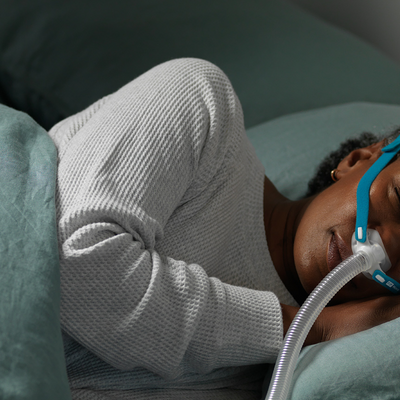Behavioral choices, genetic factors, and pre-existing health conditions shape your body and the ways you move, eat, and live. They also impact the severity and risk of developing sleep apnea, plus the myriad of conditions that link to OSA.
This confluence of health conditions and risk factors is known as comorbidity, a medical term best understood by its parts. ‘Co’ indicates two or more things that act or exist together, while ‘morbidity’ signifies a medical condition, illness, or disease. Therefore, ‘comorbidity’ is a medical condition — in this case, sleep apnea — that occurs alongside one or more medical conditions in a person.
It’s important to note that sleep apnea comorbidities are not necessarily caused by other medical conditions, nor do they cause other conditions to develop. Instead, comorbidities share a connection because they are so frequently found together in patients. And often, the reason for the connection is unclear.
Is Obstructive Sleep Apnea a Comorbidity?
Because OSA is a comorbidity, untreated OSA makes a person more likely to have or develop other chronic health conditions. Based on a 2019 study published in Multidisciplinary Respiratory Medicine, here’s what we know about sleep apnea comorbidities:
- There is a high prevalence of comorbidities in people with OSA.
- OSA is associated with metabolic and cardiovascular diseases, such as diabetes and heart disease.
- Prevalence of comorbidities in people with OSA increases with age.
- Comorbidities vary between men and women. For example, hypertension and depression are more common among women with OSA, while type 2 diabetes and heart disease are more common in men with OSA.
While sleep apnea is more often linked to specific medical conditions, researchers have yet to establish how these conditions are linked. Therefore, comorbidities continue to be important, ongoing topics in OSA research.
What are The Comorbidities of Sleep Apnea?
Common comorbidities of Obstructive Sleep Apnea are diabetes, obesity, heart disease, stroke, hypertension, and depression. For more details describing the connection between sleep apnea and a specific comorbidity, click on the link in each section below.
Diabetes and Sleep Apnea
OSA is highly prevalent among people with diabetes. People with severe OSA are more likely to develop diabetes; and people with diabetes, especially those who are obese, are more likely to have OSA. In fact, the majority (54.5%) of patients with diabetes also have OSA, while 86% of obese patients with type 2 diabetes have OSA.
The effects of disrupted at-sleep breathing patterns, plus the resulting daytime sleepiness and fatigue, could impact glucose metabolism and the body’s sensitivity to insulin — which could increase risk for development or progression of diabetes.
Obesity and Sleep Apnea
Weight, measured specifically via Body Mass Index, is an indicator of sleep apnea risk. While increased body weight is linked to higher risk of OSA, people with OSA also have a higher risk of weight gain or obesity.
Plus, obesity may worsen the effects of OSA and its comorbidities. Increases in body weight are associated with more severe OSA and increased risk for other medical conditions, such as type 2 diabetes, hypertension, stroke, and heart disease.
Heart Disease and Sleep Apnea
Untreated OSA, particularly more severe OSA, is connected to greater risk of cardiovascular disease. The cycle of apneas, in which the body stops breathing for at least 10 seconds, reduces blood oxygen levels and causes a spike in heart rate and blood pressure. Over time, the body’s stress response to disrupted breathing can contribute to heart problems, including arrhythmia (especially atrial fibrillation), heart disease, heart attack, heart failure, and sudden cardiac death.
Stroke and Sleep Apnea
OSA can be an after-effect of stroke; it’s also a significant risk factor for first-time or recurrent stroke. The more severe the OSA, the higher the risk of stroke and more severe the prognosis. Stroke patients with OSA typically experience more severe initial symptoms, prolonged hospitalization, and more time in rehabilitation.
The regular, nightly pauses in breathing (apneas) reduce blood oxygen levels and elevate blood pressure within the brain. These changes may impair the brain’s ability to regulate blood flow to the brain — which makes people with untreated OSA more likely to experience stroke.
Hypertension and Sleep Apnea
Patients with OSA experience elevated blood pressure during sleep, and often during wakefulness. This blood pressure variability makes hypertension a recognized cause of secondary hypertension, and it exposes OSA patients to risk of stroke and cardiovascular diseases.
Depression and Sleep Apnea
People with OSA have a higher prevalence of depression than those without OSA. While the relationship between the conditions remains unclear, both share symptoms — fatigue, sleep problems, anxiety — that may cause under-diagnosis of OSA among depressed patients.
Renal Disease and Sleep Apnea
Renal disease shares common risk factors with OSA: hypertension, diabetes, obesity, and older age. These shared risk factors may contribute to the onset and development of multiple comorbidities in a person.
Cancer and Sleep Apnea
Further research needs to be conducted on the association between OSA and cancer. While a 2012 study in the American Journal of Respiratory and Critical Care Medicine linked sleep-disordered breathing with an increased cancer risk, there is no definitive evidence to make the claim that cancer and OSA are comorbidities.
Is Sleep Apnea a Comorbidity for COVID-19?
According to a 2021 study by researchers at Kaiser Permanente Southern California, people with untreated sleep apnea — particularly people with severe OSA — have a greater risk of catching COVID-19. While OSA has not been established as a risk factor for patients with COVID-19, higher rate of infection may connect to the overlap of comorbidities for both OSA and COVID-19, such as diabetes, obesity, hypertension, and cardiovascular disease.
Are There Other Sleep Apnea Comorbidities?
Additional OSA comorbidities include ..
- Fatigue
- Anxiety
- Fibromyalgia
- Post-Traumatic Stress Disorder (PTSD)
- Asthma
- Chronic Obstructive Pulmonary Disease (COPD)
- Gastroesophageal Reflux Disease (GERD)
- Hyperlipidemia (high cholesterol)
If you have undiagnosed OSA, you are more likely to develop or worsen other medical conditions. Therefore, treating OSA significantly reduces your symptoms, long-term damage to your health and happiness, and the risk of comorbidities.
To find out if you have OSA, take a home sleep test with Lofta. With the results of the one-night sleep study, a doctor will determine a diagnosis and, if diagnosed, a treatment plan. Sleep apnea could be putting you at risk for other chronic health problems. Treat sleep apnea, and you can curb your symptoms and the harmful effects of OSA comorbidities.
















